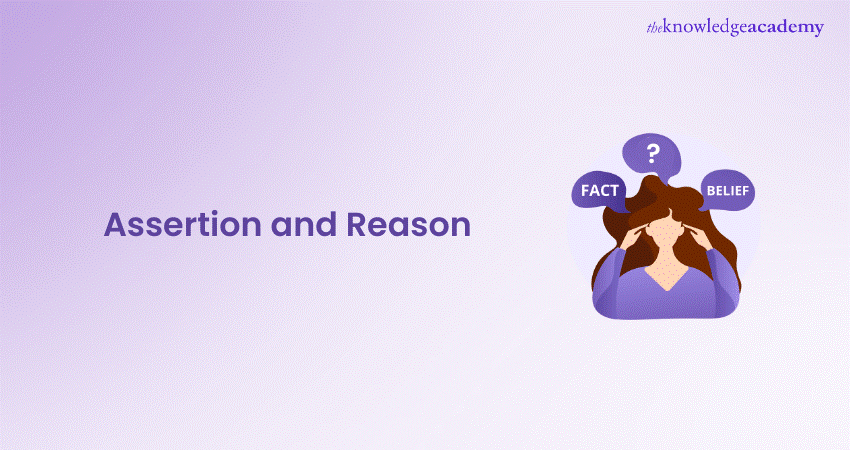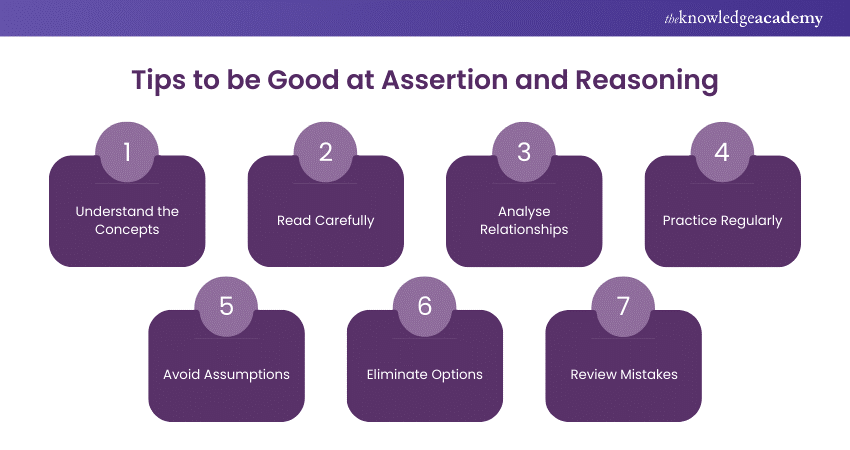We may not have the course you’re looking for. If you enquire or give us a call on 01344203999 and speak to our training experts, we may still be able to help with your training requirements.
We ensure quality, budget-alignment, and timely delivery by our expert instructors.

Ever faced statements that push your critical thinking to the limit? Grasping the link between an Assertion and a Reason is crucial for boosting your problem-solving and decision-making skills. This blog dives into the world of Assertion and Reason, breaking down various types and offering strategies to master them.
We simplify complex concepts and provide clear examples to guide you. Whether you’re gearing up for exams or aiming to sharpen your analytical skills, this blog will help you become a pro at logical reasoning.
Table of Contents
1) What is Assertion and Reason?
2) Types of Assertion and Reason
3) Strategies & Tips to be Good at Assertion and Reasoning
4) Assertion and Reasoning Solved Examples
5) Conclusion
What is Assertion and Reason?
Assertion is a statement or claim that something is true. It presents a fact or opinion that needs to be analysed or validated. For example, "The sky is blue" is an Assertion.
Reason is the explanation or justification for the Assertion. It provides the logic or evidence behind the Assertion. For example, "because of the scattering of sunlight by the atmosphere" is the Reason why the sky appears blue.
In exams and critical discussions, Assertion and Reason questions are used to assess whether a person can logically connect the two statements and determine if the Reason correctly explains the Assertion.
Types of Assertion and Reason
There are several types of relationships between Assertions and Reasons. Understanding these types can help analyse and answer Assertion and Reason questions effectively.
Matching
In this type, the Reason perfectly supports and explains the Assertion. The Reason provides a valid and logical explanation for the Assertion, showing a clear cause-and-effect relationship.
Example:
a) Assertion: Plants need sunlight to grow
b) Reason: Sunlight is essential for photosynthesis in plants
In this example, the Reason directly supports the Assertion, as sunlight is indeed necessary for photosynthesis.
Contradictory
In this type, the Reason contradicts the Assertion. The Reason provides information that goes against the Assertion, showing that they cannot both be true.
Example:
a) Assertion: Eating sugar improves dental health
b) Reason: Sugar feeds bacteria that cause tooth decay
Here, the Reason contradicts the Assertion because eating sugar actually harms dental health by feeding harmful bacteria.
Partially Correct
In this type, the Reason is partially correct but does not fully explain the Assertion. There may be a loose connection, but it is not strong enough to be considered a complete explanation.
Example:
a) Assertion: Exercise helps in weight loss
b) Reason: Exercise increases appetite
While exercise does help in weight loss, the Reason given (increasing appetite) is not a complete explanation. The correct Reason would be that exercise burns calories.
Irrelevant Reason
In this type, the Reason is unrelated to the Assertion. The Reason provides information that has no connection to the Assertion, making it irrelevant.
Example:
a) Assertion: The Earth orbits the sun
b) Reason: The Earth is round
The Reason is irrelevant because the shape of the Earth does not explain why it orbits the sun.
Reverse Reason
In this type, the Reason is correct, but the relationship is reversed. The Reason explains a different Assertion, or the Assertion explains the Reason but not vice versa.
Example:
a) Assertion: Lightning causes thunder
b) Reason: Thunder causes lightning
The Reason is correct in describing a relationship between lightning and thunder, but the cause-and-effect order is reversed.
Strategies & Tips to be Good at Assertion and Reasoning
Mastering Assertion and Reason questions requires practice and a strategic approach. Here are some tips to help you excel:

a) Understand the Concepts: Ensure you have a clear understanding of the subject matter. Familiarise yourself with basic principles and concepts to identify correct relationships.
b) Read Carefully: Pay attention to the wording of both the Assertion and Reason. Look for key terms that indicate logical connections or contradictions.
c) Analyse Relationships: Determine whether the Reason directly supports, contradicts, or is irrelevant to the Assertion. Look for cause-and-effect relationships.
d) Practice Regularly: Solve practice questions and past exam papers to improve your skills. The more you practice, the better you’ll become at identifying patterns and relationships.
e) Avoid Assumptions: Stick to the information provided in the statements. Avoid making assumptions or adding external knowledge unless necessary.
f) Eliminate Options: In multiple-choice questions, eliminate options that are clearly incorrect. Narrowing down your choices can make it easier to find the correct answer.
g) Review Mistakes: Learn from your mistakes by reviewing incorrect answers. Understanding why an answer was wrong will help you avoid similar errors in the future.
Learn the ability to express confidently with our Assertiveness Training – Join today!
Assertion and Reasoning Solved Examples
Let's look at some solved examples to illustrate how to approach Assertion and Reason questions:
Example 1
a) Assertion: Water boils at 100°C at sea level
b) Reason: Atmospheric pressure is lower at higher altitudes
Analysis: The Assertion is true, but the Reason does not explain it. Atmospheric pressure affects boiling points, but the Reason given is irrelevant to the specific Assertion about sea level. Therefore, the Reason does not support the Assertion.
Example 2
a) Assertion: Plants release oxygen during photosynthesis
b) Reason: Oxygen is a by-product of photosynthesis
Analysis: The Reason perfectly supports the Assertion, as oxygen is indeed a by-product of photosynthesis. The Reason provides a valid explanation for the Assertion.
Learn to articulate ideas clearly with our Effective Communication Skills Course – Join today!
Conclusion
Understanding the relationship between Assertions and Reasons is crucial for critical thinking and problem-solving. By identifying the types of Assertion and Reason relationships and using effective strategies, you can improve your analytical skills and perform better in exams and real-life situations. Practice regularly, stay curious, and continue to explore the fascinating world of logic and Reasoning.
Learn effective negotiation techniques with our Negotiation Skills Training – Join today!
Frequently Asked Questions
What Makes a Statement an Assertion?

A statement is an Assertion when it presents a claim or fact that someone believes to be true. It is a clear, straightforward statement that needs support or evidence, like "The Earth is round."
Is Asserting the Same as Arguing?

Asserting is not the same as arguing. Asserting is simply stating something as a fact while arguing, which involves giving reasons and evidence to support or prove that Assertion. Arguing is about persuading others to accept your point of view.
What are the Other Resources and Offers Provided by The Knowledge Academy?

The Knowledge Academy takes global learning to new heights, offering over 3,000 online courses across 490+ locations in 190+ countries. This expansive reach ensures accessibility and convenience for learners worldwide.
Alongside our diverse Online Course Catalogue, encompassing 19 major categories, we go the extra mile by providing a plethora of free educational Online Resources like News updates, Blogs, videos, webinars, and interview questions. Tailoring learning experiences further, professionals can maximise value with customisable Course Bundles of TKA.
What is The Knowledge Pass, and How Does it Work?

The Knowledge Academy’s Knowledge Pass, a prepaid voucher, adds another layer of flexibility, allowing course bookings over a 12-month period. Join us on a journey where education knows no bounds.
What are Related Courses and Blogs Provided by The Knowledge Academy?

The Knowledge Academy offers various Communication Skills Course, including the Assertiveness Skills Training, Effective Communication Skills Course, and English Grammar Course. These courses cater to different skill levels, providing comprehensive insights into Communication Barriers.
Our Business Skills Blogs cover a range of topics related to Communication, offering valuable resources, best practices, and industry insights. Whether you are a beginner or looking to advance your Communication skills, The Knowledge Academy's diverse courses and informative blogs have got you covered.
Upcoming Business Skills Resources Batches & Dates
Date
 Assertiveness Skills Training
Assertiveness Skills Training
Fri 4th Apr 2025
Fri 6th Jun 2025
Fri 1st Aug 2025
Fri 3rd Oct 2025
Fri 5th Dec 2025






 Top Rated Course
Top Rated Course



 If you wish to make any changes to your course, please
If you wish to make any changes to your course, please


